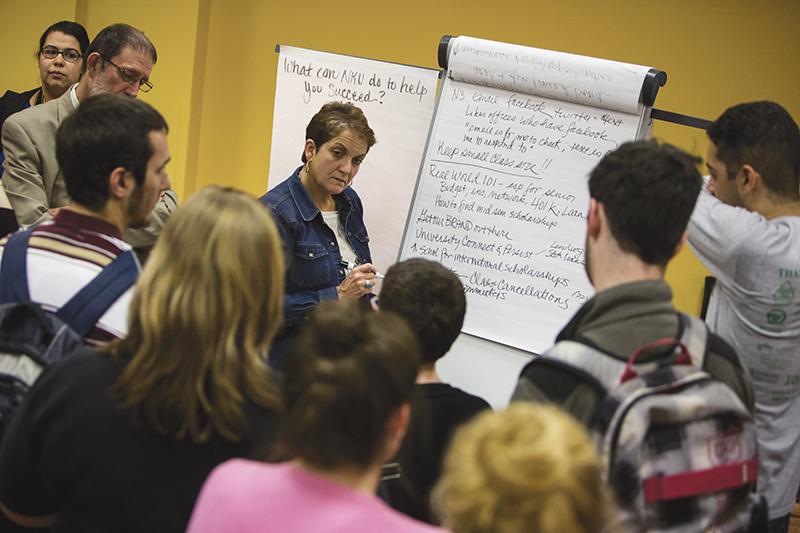Student feedback heard in Strategic Planning session
Students gathered around various strategic planning committee representatives at April 2 open forum.
NKU’s Strategic Planning Committee reached out to students on April 2 by way of a feedback session to gauge student opinions on issues revolving around the university.
The student-only session featured representatives from seven of the 10 implementation teams, according to Dr. Vickie Natale, the executive director of the planning and performance of the university’s institutional effectiveness.
The representatives asked students questions related to their implementation teams for feedback. An estimated 90-100 students gathered in the University Center Ballroom, according to Katie Herschede executive assistant to the president/secretary to the Board of Regents.
The hour-long feedback session was divided into 15-minute sessions, according to Natale. She added that through that method, students could choose which four of the seven they wanted to visit.
The three implementation teams that were absent for the session, the Human & Organizational Development, Financial Resources and the Inclusive Excellence teams, were not there for different reasons.
Natale said that the Human & Organizational Development team wasn’t there because that team works with NKU employees and that the Financial Resources team had “already done a preliminary report.”
The teams were formed across the university from different backgrounds, according to the Senior Vice President of Institutional Effectiveness Dr. Sue Hodges Moore.
“We have formed teams made of staff, faculty, students in some cases, administrators throughout the campus to help develop plans that can further implement the Strategic Plan,” Hodges Moore said. “A lot of times in organizations, they spend a lot of time developing a strategic plan, and then it sits on the shelf gathering dust. That’s not going to happen at Northern Kentucky University.”
Natale suggested that students interested in learning more about the different implementation teams can visit the site, which has timelines for each of the individual teams and shows what each team has done.
“You can see what [the committees] are looking at and dealing with,” Natale said. “You got these committees… What their timeline is for what they’re doing and who’s involved, the membership of the committee. That sort of thing.”
Since the strategic plan was passed in November, President Geoffrey Mearns has strived toward transparency, according to Hodges Moore.
“It seeks the participation of individuals all across campus, whether that’s faculty, staff, students, so forth,” Hodges Moore said. “One way we’re doing that with these implementation plans is to hold these open forums.”
Of all the implementation teams, both Natale and Hodges Moore think Student Retention & Success were the most important to students.
“They are drilling down on what it is that we can do to help students, of all backgrounds, be successful whether residential students, commuter students, adult students. It’s really the centerpiece of the strategic plan,” Hodges Moore said.
Students who didn’t make it to the session but still want to ask questions or give feedback can do so at https://nku.co1.qualtrics.com/SE/?SID=SV_6nfUuN1ALMmCOuV
Marketing & Public Awareness
By Courtney Ferguson & Brody Kenny
The Marketing & Public Awareness booth at the Strategic Plan Forum brought students together to discuss how best to to promote NKU to prospective students.
At the forum, one of the first concerns brought to light was: “NKU doesn’t get the university status it deserves,” said junior Erin Edwards.
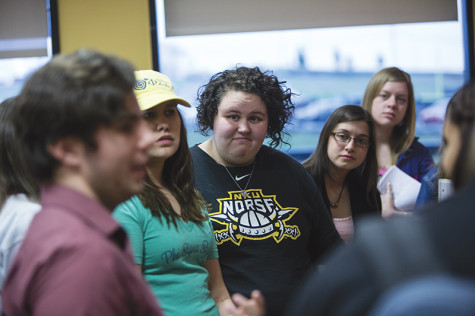
Students feel the positive aspects of NKU should be emphasized, such as accessibility, student involvement, class size, affordability, appearance of classes, and hands-on-learning.
“NKU has such a small campus feel, and I think that you can have fun and still be in your backyard if you live here,” said Trevor Dunaway, a senior accounting major.
Madisson Dougherty, a sophomore finance major, says she has been greatly encouraged by the support provided by NKU.
“The way the community of school is actually involved itself has helped me a lot because I wasn’t really expecting that at first,” Doughtery said.
When she was an incoming student, Doughtery was concerned about not getting the “typical” college experience, but she says her fears were unfounded.
“With living at home, I still get to do the college experience because I was really afraid of that first,” Doughtery said.
Many students expressed concerns about the lack of advertisements outside of Northern Kentucky. A student participant said that “in Northern Kentucky every other commercial is for NKU, across the river there is hardly any.”
While some students agree that NKU has a small school feel, they agree there are a lot of “big school opportunities,” and that NKU’s in the “transitioning phase” of it’s identity.
Community Engagement
By Alyson Schoenung & Katie Smolkovich
Voices talking over one another reiterated the same idea: students who aren’t involved on campus have a hard time finding opportunities and information encouraging participation in service learning.
Dr. Doris Shaw, College of Business department chair and facilitator of the Community Engagement session and a representative of the Community Engagement team, responded to student Arturo Minera’s plea for more service learning classes throughout the university by asking, “Let me flip this on you; do you think we need more?”
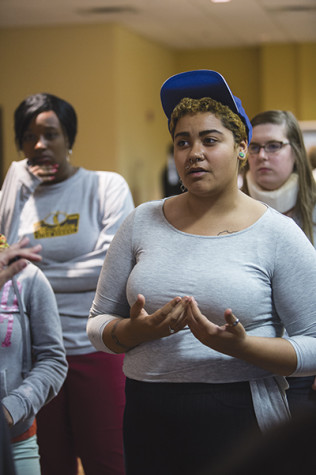
Minera, a senior electronic media and broadcasting major, spent the majority of his time at the open forum pushing for more service learning classes across departments, especially those accessible to commuter students.
“I know there’s a lot of community service opportunities,” Minera said. “But I don’t see opportunities for commuters to engage in the traditional definition of community service at a time that they can do it,” he said.
Minera also expressed his frustration with the current system of service learning classes. So far service learning classes have only been offered across specific departments and courses, which means that many students don’t know they exist, or that they can gain service learning experience as part of their academics. He believes integrating them in general education courses would be a great opportunity.
Dr. Shaw was thankful for the ability to have students participate in the forum.
“I think the students have a viewpoint that is so enriching to what we’re doing,” Shaw said. “I don’t think we could’ve come to any conclusions without talking to the students.”
Shaw spent a lot of time asking questions of the students in an effort to understand their opinions more thoroughly.
Josh Tunning, a graduate student in Public Administration suggested that more involvement in the community will enforce student and alumni pride.
Tunning’s past experience as an alumni involved calling people and asking for donations to the university.
“That’s important, but a lot of leaders in the region need to connect with current students through service learning activities,” Tunning said.
Shaw said that NKU’s image as a college involved in service learning is separate from advertising and recruitment for the university itself.
“I’m excited about their willingness to share, it’s eye opening in a way,” Shaw said. “I am very enlightened by their perspective.”
Facilities & Sustainability
By Troy Bendgen & Emily Hodges
A lot of construction has been happening on NKU’s campus the past few years and the work has only just begun.
The completion of Griffin Hall was one step, but the Health Innovation Center, Norse Commons, and the new Recreation Center projects will hopefully be completed in during the next five years, according to the Fuel the Flame Strategic Plan.
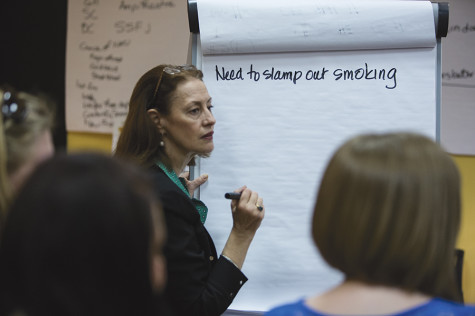
Matthew White, a sophomore social work major, said he doesn’t know what campus life is like without the bulldozers and the cautioned off fencing because he lives on campus and constantly deals with it.
“I think that construction needs to stop right now because whatever they wasted their money over by the library, they just put in more concrete,” White said. “I don’t see a use in that.”
White also said that he is worried that the construction on Norse Commons isn’t going to be finished by its original date.
Matt Frentz, Finance chair of SGA and Political Science major believes that the frustrating process of construction is worth it in the end because it will make campus better. Construction projects, he says are frustrating but are also temporary and says that NKU will have a very improved campus in a relatively short amount of time.
Even though there may be controversy over paying for the new Health Innovations Center and other construction projects, Frentz reminds students that they are paying it forward. “The students before us paid for the Student Union and Griffin Hall and they never got to see that.”
The newer buildings on campus such as Griffin Hall are highlights on campus for White and he likes the newer buildings that are in the works. As far as paying for the new Health Innovation Center, which will barely be started by the time he graduates, White said he doesn’t mind.
“As long as my money is going to benefit somebody who comes here eventually I am not too worried about it,” White said.
Student Enrollment
By Justin Wolstenholme & Richard Cracchiolo
The Student Enrollment implementation team concluded that students found funding to be a critical factor in applying to NKU.
“We need to supply more funding options for students. That seems to be a general theme,” Arnie Slaughter, the director of university housing as well as a member of the Student Engagement team said.
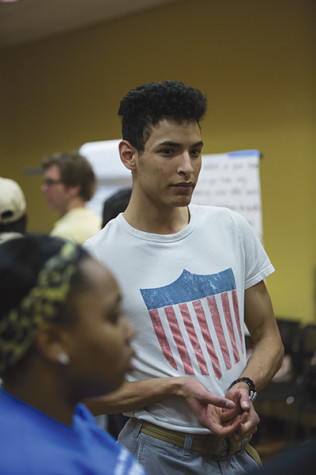
Slaughter also suggested the idea that students should be required to live on campus during their freshmen year, in order to gauge student reactions.
Marcel Hughes, a sophomore social work major, thinks it is a “good idea for freshmen to live on campus.” He added that incoming freshmen coming from the Northern Kentucky area will have an easier time adjusting to campus life that way.
Before the university tries to adopt such a policy, Hughes suggests that NKU must make its dorms “liveable and homey.” He said he believes this is important because in the past he has noticed mold in his dorms and that a “major problem is what on campus housing provides.”
Some of the other problems Hughes pointed out were the dorm bathrooms and hostile roommates. He said that he’s seen people who were new on campus live in the dorms for a year and then move out because they couldn’t cope with those issues.
To help implement Slaughter’s idea, Hughes suggested that the university should also try to target high school students from public and private schools in Cincinnati. Other things that students suggested to the Student Enrollment team included better marketing and engagement for the study abroad experience, that NKU target high school minority students and that the university should put more effort towards communicating with the community to highlight university efforts.
Student Retention and Success
By Erin Mullins & Alex Weber
The Student Retention & Success Strategies team focused their efforts around getting students connected to other students, faculty members and the community
Pat Moynahan, vice provost, said the best way to help students succeed is to, “find ways to help students connect.”
“Students who are engaged are more likely to persist,” Moynahan said.
Moynahan also said events like the forum are really important because it allows people to have their voice heard.
“This is a really safe, comfortable atmosphere for people to say whatever they want and that’s really what we want. Don’t tell us what we want to hear, tell us what we need to hear,” Moynahan said.
Students had the chance to voice their opinions about wanting to be better informed by faculty members, generally.
Chandler Taylor, junior theatre arts major, said, “Students often times don’t know what is happening on campus and that text or email would be one of the best ways to contact students.”
Katie Cox, senior business major and Academic Affairs Chair at the SGA, agreed with Taylor and said, “I think the more communication we hear the better. I’d rather get blasted ten different ways through communication than only having one method of communication.”
One concern students brought up is the lack of financial aid given to students that are here longer than four years.
Taylor said, “Students are really concerned about continuing scholarships. I hadn’t really thought about it a whole lot but if you are here more than four years, you’re really on your own as far as the university is concerned. There’s little to no help or aid from the university.”
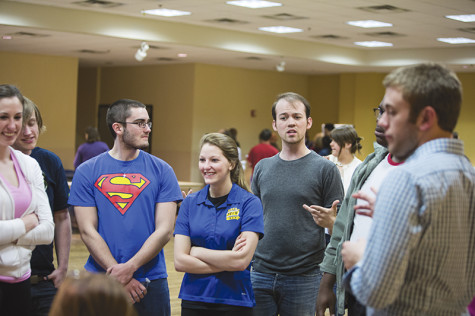
Another issue that is a concern to students is providing activities for the diverse group of students we have on campus.
Christopher Walters, a junior marketing major, said, “Students that aren’t involved in Greek life don’t have many opportunities tailored for them.”
“There’s nothing really for students that aren’t involved Greek Life. They don’t know what is happening, so they go home on the weekends and they don’t build a loyalty or connection with campus and really get involved and invested in NKU,” Walters said.
Getting students involved in the process is the best way to improve retention and success.
Moynahan said, “This is the way democracy works. This is the way we improve things. Let’s get the voices of all the stakeholders and see how we can collectively serve them better.”
Technology Support
By John Flaherty & DeSherion McBroom
Students discussed tech support issues with administrative members of both IT and marketing & communications as part of the Strategic Plan forum on NKU’s Fuel the Flame initiative.
Several students, such as junior social work major Melina Thomas, came prepared to the forum with a list of their concerns they wanted to address.
“I would say half of these are not mine,” said Thomas, who had also written down the opinions of her coworkers at the Center for Applied Informatics who could not be at the forum. “But a lot of them were generally brought up, and I agree with them.”
Thomas and other students were able to directly address their complaints to Tim Ferguson, Associate Provost and Chief Info Officer of IT, as well as Jim Nilson, Director of Marketing and Communication, who helped to develop the NKU website, the iNKU app, and many other NKU systems.
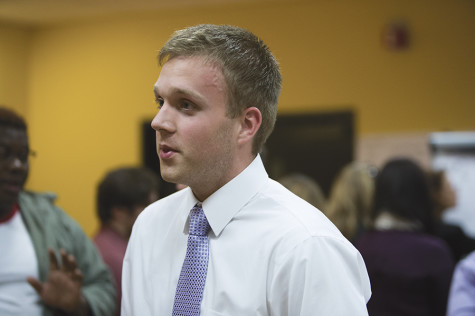
Thomas says that her biggest tech concern for the future of NKU, is the issues that plague the SAP class registration system.
“Class registration and the degree audit, and just the options that it says we have as students, they don’t work, or they have a flaw. It makes it very difficult for us to use them,” Thomas said.
Thomas also asked for improvements and more functionality in the iNKU app, suggesting that they add the capability for students to schedule advising appointments and other services that can only currently be done through the desktop NKU website.
“It works well, it just was not made well” said Thomas, of the features the iNKU app does have.
Most students enjoy working with the technology, but did have a few concerns on how they thought the technology on campus could be improved. For social work major Alley Miller who is a grad-student here at NKU, it sometimes becomes difficult to finish her work while in the MEP building.
“The computer labs in the MEP building always close at 5 p.m. When the computer lab closes I usually have to go to the library or home in order to finish the rest of my work,” said Miller. “Extending those computer lab hours would be very beneficial and would work better rather than packing up and heading to a different building.”
Many students suggested working on easily solved problems, such as a number to call when public printers have run out of paper or toner. Still, other students, such as senior Trevor Dunaway, felt that NKU has adapted well to new technology.
“I think NKU does a great job with how they handle technology. They’re always being innovative and trying to better our campus,” Dunaway said.
Academic Innovation
By Kerry Skiff
Students want application, not concepts. This is what the view students voiced to the Academic Innovation team. According to senior entrepreneurship major Jason Hulett, getting a job used to be about having experience, and then employers wanted to see a degree. Today, the real world is back to looking for experience, and Hulett wants to get it before graduation.
Hulett said that colleges need to “update themselves” in their curriculum and have more experiential learning, such as going out and visiting places in the community where they could possibly be employed someday.
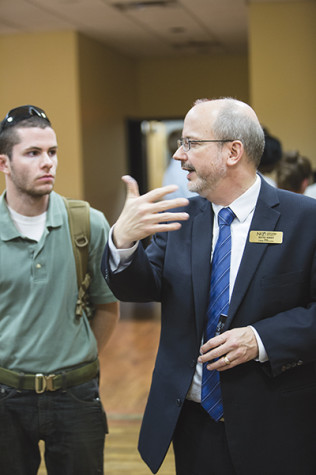
Hulett said that it’s fine for students to be taught concepts and fundamentals, but that eventually the teaching needs to be less conceptual and more applicative. “I need help applying [my learning],” he said. “I need experience applying it.”
Another student agreed, saying that after two or three years of college, he got bored with it. He wanted to use what he has been taught.
“The whole curriculum should be designed to give you experience” said Hulett.
The university should monetize the classroom, said Hulett. Classes can work on a project and then release it to the market, observing how the public responds to their work. He suggested that professors could have the class work on a concept as a team and then release it into the market.
“Bring something to the market and see what the response is,” he suggested.
Many students voiced concerns about getting experience outside the classroom. Some felt that internships should be required, while others feel that it is more beneficial to visit businesses that are in their field, to shadow and see what their job would entail after graduation.
Students feel educated in their field, but they lack the confidence to apply that learning. “However they can implement that is worth the expense,” Hulett said.
Your donation will support the student journalists of Northern Kentucky University. Your contribution will allow us to purchase equipment and cover our annual website hosting costs.


